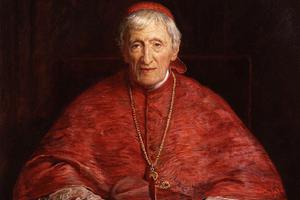Blessed John Henry Newman and Contemporary Concerns
BOOK PICK Newman and History

NEWMAN AND HISTORY
By Edward Short
Gracewing, 2017
359 pages (paperback), $27
To order: gracewing.co.uk or amazon.com
People are generally not neutral about Blessed John Henry Newman: He was either generally liked or hated in his day, and the cardinal-convert remains controversial today.
Some call him an English traitor, a talented and intelligent man who succumbed to superstition in embracing Romanism. To others, he was the quintessential Englishman who rediscovered his country’s true and ancient religious roots.
In our own day, is Newman a theologian who, in explaining the development of doctrine, expounds a 19th-century “hermeneutic of continuity,” or did his own campaign against liberalism blind him to the “liberal Newman”?
Edward Short’s newest book examines Cardinal Newman from the viewpoint of history: Cardinal Newman’s own views of history and how history has viewed him. It is a rich, thorough, comprehensive and scholarly work, yet one that lets Newman be Newman, not what some contemporary scholars want him to be.
In 11 chapters, Short treats different aspects of Newman considered historically. The two longest chapters discuss Newman’s polemic with Edward Gibbon (of Decline and Fall of the Roman Empire fame) and Newman’s lifelong criticism of liberalism (at least as understood in the 19th century). Other chapters discuss his views of popular piety and how his contemporaries saw that; Newman’s view of law; Newman as seen through his letters; parallels between Newman and C.S. Lewis as converts; and two reviews of books on Newman.
This is a scholarly book with detailed footnotes. Its most obvious audiences — readers seriously interested in Newman and British Catholic history — are limited. I note “seriously.” This is not an introductory work about Newman. Short presupposes knowledge of Newman’s life; Short’s clear opinions presuppose familiarity with the underlying issues.
But I think there is a third, larger audience, albeit a readership that has to read between the lines: those interested in discovering how so many of the problems Newman addressed are still around, especially in intellectual culture.
Let me give one example related to Newman and Gibbon. Gibbon blamed the victory of the Church’s monotheism for sweeping away the “tolerance” of Roman paganism and deemed the fall of that Rome a loss.
You can look at Gibbon as a historical problem or as a thesis that keeps coming back in different forms.
When Harry Blackmun in Roe v. Wade suggests that Hippocrates’ opposition prevailed over the “tolerance” of abortion in antiquity because Christianity triumphed in the Roman Empire, that’s warmed over Gibbon. When post-moderns blame all things wrong in Irish history on St. Patrick’s “intolerance” of paganism and the Church’s opposition to the religion of the “wee people,” it’s Gibbon redux.
“What Newman found most objectionable about Gibbon’s polemical treatment of Christianity was … that it prefigured the widespread infidelity to which liberalism would give rise in the nineteenth century and … [w]hat was even more distressing to Newman, rank, unreflecting unbelief.”
Why did Cardinal Newman’s conversion rankle his contemporaries? England’s intellectuals rebuked him because they saw him as a traitor to their class, even as their prejudices deemed Popery unpatriotic and the whole idea of truth in religion dubious.
“The arrogance … may be comical; but it was an arrogance shared by many skeptical Englishmen for whom the evidentiary claims of Christianity were bogus,” Short writes. “One cannot resist quoting the witty Duff Cooper, who had the occasion to observe in his autobiography that, for the English, ‘there are only two religions: Roman Catholicism, which is wrong; and all the rest, which don’t matter.’”
But is Newman’s world really different from moderns who reject orthodox Christianity in favor of some gauzy “spirituality,” or replace the God of Abraham, Isaac and Jacob with the “God of Good Feelings”? This book shows that the more things change …
John M. Grondelski, Ph.D., writes from Falls Church, Virginia.
















